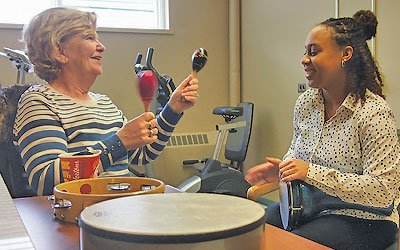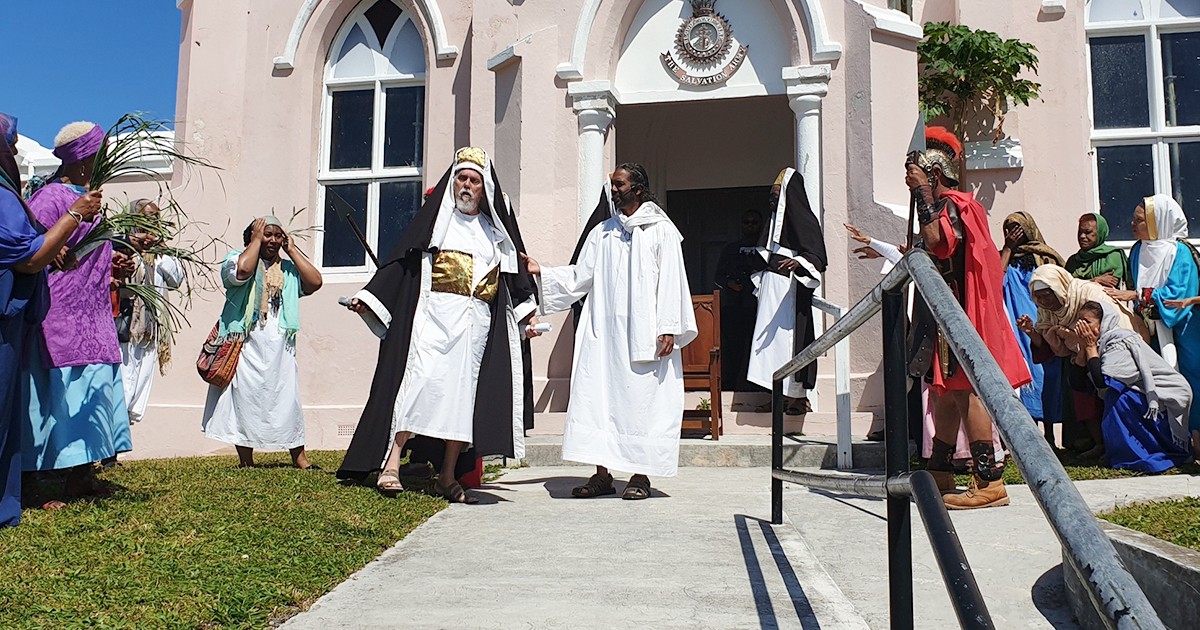One of music therapist Hayley Francis Cann’s patients was a woman in long-term care suffering from dementia.
“Before her condition worsened, she’d walked away from religion and had rejected the church,” Hayley recalls.
But as her dementia progressed, Hayley discovered that the woman responded to the Sunday school songs that had resonated with her in her youth.
“Her face would light up and she knew the songs word for word, even in her condition,” Hayley says. “Her family was surprised due to how adamant she’d been against worship and religion. It opened up conversation not only for her, in her state, but with the woman’s family about their own faith.”
Hayley was blessed to be with the family in the room an hour before the woman passed away.
“We were singing the old hymns and it was a beautiful time,” Hayley says. “I strongly believe that God gives us the opportunity to connect with Him in our final moments. And I have still stayed connected with that family.
“By creating these connections that have such meaning, music therapy has become more than just a job I do.”
“Sign Me Up”
A third-generation member of The Salvation Army, Hayley was born in Halifax while her mother was attending university.
Following her studies, Hayley’s mother returned home to Bermuda, where six-year-old Hayley discovered her love for music by joining the junior band of her Salvation Army church and playing the trumpet.
“Music came naturally to me, I think, because my family was so involved in The Salvation Army, primarily through the ministry of music,” Hayley says. “My mother was in the band, and both my grandfathers had been in band leadership roles. In some form, everybody in my family has participated in either the songster groups [choirs] or the band at some point in their lives, and I knew that at some point I would end up there as well.”
During her adolescence, Hayley attended various conferences and music camps in Bermuda and Canada, joined the senior band, played at open-air services and mentored young musicians.
Eventually, Hayley decided to leave home and study at Acadia University in Wolfville, N.S.
“I knew I wanted to pursue a career in music, but I also knew I did not want to be a performer or a music teacher,” she says. “From my visits with the Army band to hospitals and rest homes, I appreciated the power of music on God’s people, and so when I found that Acadia had a music-therapy program, I said, ‘Yes! Sign me up!’ ”
Finding a Calling
While at Acadia, Hayley had the opportunity to reflect on and explore her faith through church groups, reading the Bible and journaling.
“I might not have understood it as a child, but by growing up and figuring out my own faith and what my relationship with God looked like, I came to understand how real it was,” she says. “I was able to make a deeper connection with my faith.”
As well, through the praise and worship portions of the Salvation Army services, Hayley saw how intimately people responded and connected with their faith based on worship music.
“After studying in university and growing closer to God in my own faith, I had no doubt that music was the calling of my life,” she says.
Making Connections
Hayley graduated from Acadia and is now a qualified music therapist situated in the Kingston area of Ontario, where she attends the Army’s Kingston Citadel church.
Her work as a music therapist serves individuals in long-term care with dementia, responsive behaviours and depressive symptoms. She also works in the community with children on the autism spectrum and adults recovering from brain injury.
“In every interaction, my aim is to provide a safe and authentic experience where God leads,” she says. “Perhaps my perspective of my purpose in this profession is a little different from that of my colleagues, but I believe the best sessions happen when I let God lead. This doesn’t mean that I am pushing the Bible on people, but it does mean that if the opportunity arises to share my faith, I absolutely will. This often allows an opportunity to engage in meaningful conversations about faith and share in a time of healing worship.”
When asked why she loves doing what she does, Hayley replies, “I’m not doing it for myself. It’s inspiring to connect with other people and to help them along their wellness journeys. I think that’s why I disconnected from the performance side of things—I didn’t think that would be enough for me. Being able to make tangible connections with people—which is so meaningful to our spiritual, emotional and mental health—continues to motivate me to do what I do.”
 Shirley Smiles
Shirley Smiles
“This photo was taken during my internship a couple of years ago in Perth, Ont. I was working with stroke-rehabilitation patients. Shirley was struggling with depression, and it was wonderful to see how music brought that kind of emotion out of her. To connect with that joyful side of who she is, outside of what had happened to her, and make her smile, was wonderful for her husband to see, and I’m glad that we were able to capture that on camera.
Mandy’s Mom, the Music Therapist
“The idea for a book was planted on my heart right after I finished my internship. The words just flew out of me, so I came to the conclusion that they were not mine and I had to do something with them. I’m a very visual learner and so I wanted something that told a story with pictures as well as words. “The book is written rhythmically. I’m a music therapist and so I wanted other music therapists to use this as a tool for advocacy. “There’s a dedication at the front of the book to my grandmother, who recently passed away, and the illustrator used a photo of her when she was younger to depict the music therapist. Likewise, she based the little girl, Mandy, on a photo of me as a young girl.”
This story is from:
“Before her condition worsened, she’d walked away from religion and had rejected the church,” Hayley recalls.
But as her dementia progressed, Hayley discovered that the woman responded to the Sunday school songs that had resonated with her in her youth.
“Her face would light up and she knew the songs word for word, even in her condition,” Hayley says. “Her family was surprised due to how adamant she’d been against worship and religion. It opened up conversation not only for her, in her state, but with the woman’s family about their own faith.”
Hayley was blessed to be with the family in the room an hour before the woman passed away.
“We were singing the old hymns and it was a beautiful time,” Hayley says. “I strongly believe that God gives us the opportunity to connect with Him in our final moments. And I have still stayed connected with that family.
“By creating these connections that have such meaning, music therapy has become more than just a job I do.”
“Sign Me Up”
A third-generation member of The Salvation Army, Hayley was born in Halifax while her mother was attending university.
Following her studies, Hayley’s mother returned home to Bermuda, where six-year-old Hayley discovered her love for music by joining the junior band of her Salvation Army church and playing the trumpet.
“Music came naturally to me, I think, because my family was so involved in The Salvation Army, primarily through the ministry of music,” Hayley says. “My mother was in the band, and both my grandfathers had been in band leadership roles. In some form, everybody in my family has participated in either the songster groups [choirs] or the band at some point in their lives, and I knew that at some point I would end up there as well.”
During her adolescence, Hayley attended various conferences and music camps in Bermuda and Canada, joined the senior band, played at open-air services and mentored young musicians.
Eventually, Hayley decided to leave home and study at Acadia University in Wolfville, N.S.
“I knew I wanted to pursue a career in music, but I also knew I did not want to be a performer or a music teacher,” she says. “From my visits with the Army band to hospitals and rest homes, I appreciated the power of music on God’s people, and so when I found that Acadia had a music-therapy program, I said, ‘Yes! Sign me up!’ ”
Finding a Calling
While at Acadia, Hayley had the opportunity to reflect on and explore her faith through church groups, reading the Bible and journaling.
“I might not have understood it as a child, but by growing up and figuring out my own faith and what my relationship with God looked like, I came to understand how real it was,” she says. “I was able to make a deeper connection with my faith.”
As well, through the praise and worship portions of the Salvation Army services, Hayley saw how intimately people responded and connected with their faith based on worship music.
“After studying in university and growing closer to God in my own faith, I had no doubt that music was the calling of my life,” she says.
Making Connections
Hayley graduated from Acadia and is now a qualified music therapist situated in the Kingston area of Ontario, where she attends the Army’s Kingston Citadel church.
Her work as a music therapist serves individuals in long-term care with dementia, responsive behaviours and depressive symptoms. She also works in the community with children on the autism spectrum and adults recovering from brain injury.
“In every interaction, my aim is to provide a safe and authentic experience where God leads,” she says. “Perhaps my perspective of my purpose in this profession is a little different from that of my colleagues, but I believe the best sessions happen when I let God lead. This doesn’t mean that I am pushing the Bible on people, but it does mean that if the opportunity arises to share my faith, I absolutely will. This often allows an opportunity to engage in meaningful conversations about faith and share in a time of healing worship.”
When asked why she loves doing what she does, Hayley replies, “I’m not doing it for myself. It’s inspiring to connect with other people and to help them along their wellness journeys. I think that’s why I disconnected from the performance side of things—I didn’t think that would be enough for me. Being able to make tangible connections with people—which is so meaningful to our spiritual, emotional and mental health—continues to motivate me to do what I do.”
 Shirley Smiles
Shirley Smiles
“This photo was taken during my internship a couple of years ago in Perth, Ont. I was working with stroke-rehabilitation patients. Shirley was struggling with depression, and it was wonderful to see how music brought that kind of emotion out of her. To connect with that joyful side of who she is, outside of what had happened to her, and make her smile, was wonderful for her husband to see, and I’m glad that we were able to capture that on camera.
Mandy’s Mom, the Music Therapist
“The idea for a book was planted on my heart right after I finished my internship. The words just flew out of me, so I came to the conclusion that they were not mine and I had to do something with them. I’m a very visual learner and so I wanted something that told a story with pictures as well as words. “The book is written rhythmically. I’m a music therapist and so I wanted other music therapists to use this as a tool for advocacy. “There’s a dedication at the front of the book to my grandmother, who recently passed away, and the illustrator used a photo of her when she was younger to depict the music therapist. Likewise, she based the little girl, Mandy, on a photo of me as a young girl.”
This story is from:










Leave a Comment